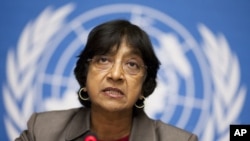The United Nations High Commissioner for Human Rights, Navi Pillay, says the food emergency in the Horn of Africa is worse in countries that do not respect the fundamental rights of their people.
More than 12.5 million people are affected by the worst drought to hit the Horn of Africa in 60 years. The U.N. human rights chief, Navi Pillay, agrees that a devastating natural phenomenon is behind this dire emergency. But she notes the failure of some governments to live up to their human rights obligations is worsening an already dreadful situation.
“There is no doubt that the deliberate obstruction of human rights and humanitarian work has exacerbated already desperate conditions," said Pillay. "The spiraling effects of the crisis are now engulfing the Horn of Africa where as many as 750,000 lives may be at risk. A denial of the right to food undermines the right to health, thus ultimately putting at risk the most fundamental of all human rights, that is, the right to life."
The high commissioner does not point her finger at any one state. However, it is well known that Somalia's Islamist al-Shabab militant group is not allowing the World Food Program to distribute food to hundreds of thousands of starving people in the areas it controls in the south.
The result is all too painfully visible. The United Nations has declared six regions in the south as famine zones and says the famine is continuing to spread.
Moving from the food crisis to the global economic crisis, Pillay notes it is the poor who bear the brunt of cost-cutting and other austerity measures. She says fears of a new global recession are prompting unrest and street protests in countries around the world.
The high commissioner says she joined in Sunday’s remembrance of the victims of the terrorist attacks against the United States 10 years ago on September 11. She says people who hold human rights in contempt continue to kill and injure innocent people.
A recent example of this, she notes, is last month’s terrorist attack against a U.N. facility in the Nigerian capital of Abuja. More than 20 people were killed and scores injured.
“In this context, let me note that the countermeasures adopted by states to combat terrorism have frequently been designed with insufficient regard to human rights," said Pillay. "This has all too often led to an erosion of rights and fostered a culture of diffidence and discrimination which, in turn, perpetuates cycles of violence and retribution.”
Pillay cites Sri Lanka as one such case. She says that country has suffered the brutal effects of terrorist acts for three decades. But instead of working to heal these wounds, she says the response of successive governments has undermined independent institutions, human rights and the rule of law.
Similarly, she says the killing of civilians by governmental and international forces engaged in counter-terrorism operations in Afghanistan, Iraq and Pakistan is a major concern.
She says the protests in the Middle East, North Africa and elsewhere stem from the denial of economic, social and cultural rights, as well as political and civil rights.
She says the violation of people’s human rights is at the root of many of the existing global crises. Just as they are the problem, she says good governance, human rights and the rule of law are also an essential part of any sustainable solution.










